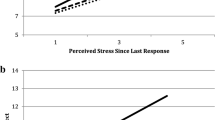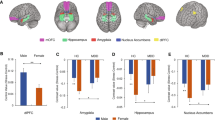Abstract
The present investigation examined emotional reactivity to stress in men and women with and without prior depression. Subjects with remitted depression (n = 55) and healthy controls with no history of psychiatric illness (n = 55) were studied using Experience Sampling Methodology to assess daily stressors and depressed mood. Main effects were observed for both female gender and past depression in increasing emotional reactivity to daily stressors. However, women experienced significantly greater emotional reactivity than men only among healthy controls and not among those with remitted depression. Formerly depressed men were more reactive to stress than men who never experienced depression, while no differences were observed for women across these groups. These findings suggest that a prior episode of depression renders men and women more equivalent in terms of stress vulnerability, thus helping to explain why gender differences in depression prevalence change as a function of prior episodes.

Similar content being viewed by others
References
Abramson, L. Y., Metalsky, G. I., & Alloy, L. B. (1989). Hopelessness depression: A theory-based subtype of depression. Psychological Review, 96, 358–372. doi:10.1037/0033-295X.96.2.358.
Alloy, L. B., Abramson, L. Y., Hogan, M. E., Whitehouse, W. G., Rose, D. T., Robinson, M. S., et al. (2000). The temple-wisconsin cognitive vulnerability to depression project: Lifetime history of axis I psychopathology in individuals at high and low cognitive risk for depression. Journal of Abnormal Psychology, 109(3), 403–418. doi:10.1037/0021-843X.109.3.403.
Alloy, L. B., Abramson, L. Y., Metalsky, G. I., & Hartlage, S. (1988). The hopelessness theory of depression: Attributional aspects. The British Journal of Clinical Psychology, 27(1), 5–21.
Almeida, D. M., & Kessler, R. C. (1998). Everyday stressors and gender differences in daily distress. Journal of Personality and Social Psychology, 75(3), 670–680. doi:10.1037/0022-3514.75.3.670.
Beck, A. T. (1983). Cognitive therapy of depression: New perspectives. In P. Clayton & J. Barrett (Eds.), Treatment of depression: Old controversies and new approaches (pp. 265–290). New York: Raven Press.
Beck, A. T. (1987). Cognitive models of depression. Journal of Cognitive Psychotherapy: An International Quarterly, 1, 5–37.
Beck, A. T., Epstein, N., Harrison, R. P., & Emery, G. (1983). Development of the Sociotropy-Autonomy Scale: A measure of personality factors in psychopathology. Unpublished Manuscript.
Cassano, G. B., Akiskal, H. S., Musetti, L., Perugi, G., Soriani, A., & Mignani, V. (1989). Psychopathology, temperament, and past course in primary major depressions. Psychopathology, 22(5), 278–288.
Clark, D. A., Beck, A. T., & Brown, G. K. (1992). Sociotropy, autonomy, and life event perceptions in dysphoric and non-dysphoric individuals. Cognitive Therapy and Research, 16, 635–652. doi:10.1007/BF01175404.
Csikszentmihalyi, M., & Larson, R. (1987). Validity and reliability of the experience-sampling method. The Journal of Nervous and Mental Disease, 175(9), 526–536. doi:10.1097/00005053-198709000-00004.
de Vries, M. W. (1992). The experience of psychopathology: Investigating mental disorders in their natural settings. New York: Cambridge University Press.
First, M. B., Spitzer, R. L., Gibson, M., & Williams, J. B. (1996). Structured clinical interview for DSM-IV. Washington, DC: American Psychiatric Association.
Gable, S. L., Reis, H. T., & Elliot, A. J. (2000). Behavioral activation and inhibition in everyday life. Journal of Personality and Social Psychology, 78(6), 1135–1149.
Ghaziuddin, M., Ghaziuddin, N., & Stein, G. S. (1990). Life events and the recurrence of depression. Canadian Journal of Psychiatry, 35(3), 239–242.
Gotlib, I. H., Lewinsohn, P. M., Seeley, J. R., Rohde, P., & Redner, J. E. (1993). Negative cognitions and attributional style in depressed adolescents: An examination of stability and specificity. Journal of Abnormal Psychology, 102, 607–615.
Haeffel, G. J., Gibb, B. E., Metalsky, G. I., Alloy, L. B., Abramson, L. Y., Hankin, B. L., et al. (2008). Measuring cognitive vulnerability to depression: Development and validation of the cognitive style questionnaire. Clinical Psychology Review, 28(5), 824–836.
Hammen, C. L. (1991). Generation of stress in the course of unipolar depression. Journal of Abnormal Psychology, 100, 555–561.
Hankin, B. L., Abramson, L. Y., & Siler, M. (2001). A Prospective test of the hopelessness theory of depression in adolescence. Cognitive Therapy and Research, 25(5), 607–632.
Husky, M. M., Grondin, O. S., & Compagnone, P. (2004). Validation de la version française du questionnaire de sociotropie-autonomie de Beck et al. (1983). Canadian Journal of Psychiatry, 49, 851–858.
Husky, M. M., Mazure, C. M., Maciejewski, P. K., & Swendsen, J. D. (2007). A daily life comparison of sociotropy-autonomy and hopelessness theories of depression. Cognitive Therapy and Research, 31(5), 659–676.
Kendler, K. S., Kessler, R. C., Walters, E. E., MacLean, C., Neale, M. C., Heath, A. C., et al. (1995). Stressful life events, genetic liability, and onset of an episode of major depression in women. American Journal of Psychiatry, 152, 833–842.
Kendler, K. S., Thornton, L. M., & Prescott, C. A. (2001). Gender differences in the rates of exposure to stressful life events and sensitivity to their depressogenic effects. American Journal of Psychiatry, 158, 587–593.
Kessler, R. C. (2000). Gender difference in major depression: Epidemiology findings. In E. Frank (Ed.), Gender and its effect in psychopathology (pp. 61–84). Washington, DC: American Psychiatric Press.
Kessler, R. C. (2003). Epidemiology of women and depression. Journal of Affective Disorders, 74, 5–13.
Kessler, R. C., McGonagle, K. A., Swartz, M., Blazer, D. G., & Nelson, C. B. (1993). Sex and depression in the National Comorbidity Survey: I. Lifetime prevalence, chronicity and recurrence. Journal of Affective Disorders, 29(2–3), 85–96.
Kessler, R. C., & McLeod, J. D. (1984). Sex differences in vulnerability to undesirable events. American Sociological Review, 49, 620–631.
Lecrubier, Y., Sheehan, D. V., Weiller, E., Amorim, P., Bonora, I., Harnett Sheehan, K., et al. (1997). The Mini International Neuropsychiatric Interview (MINI). A short diagnostic structured interview: Reliability and validity according to the CIDI. European Psychiatry, 5, 224–231.
Lewinsohn, P. M., Rohde, P., Seeley, J. R., Klein, D. N., & Gotlib, I. H. (2000). Natural course of adolescent major depressive disorder in a community sample: Predictors of reccurrence in young adults. American Journal of Psychiatry, 157(10), 1584–1591.
Maciejewski, P. K., Prigerson, H. G., & Mazure, C. M. (2001). Sex differences in event-related risk for major depression. Psychological Medicine, 31, 593–602.
Marco, C. A., Neale, J. M., Schwartz, J. E., Shiffman, S., & Stone, A. A. (1999). Coping with daily events and short-term mood changes: An unexpected failure to observe effects of coping. Journal of Consulting and Clinical Psychology, 67, 755–764.
Mazure, C. M. (1998). Life stressors as risk factors in depression. Clinical Psychology: Science and Practice, 5, 291–313.
Merikangas, K. R., Mehta, R. L., Molnar, B. E., Walters, E. E., Swendsen, J. D., Aguilar-Gaziola, S., et al. (1998). Comorbidity of substance use disorders with mood and anxiety disorders: Results of the international consortium in psychiatric epidemiology. Addictive Behaviors, 23(6), 893–907.
Metalsky, G. I., Joiner, T. E. J., Hardin, T. S., & Abramson, L. Y. (1993). Depressive reactions to failure in a naturalistic setting: A test of the hopelessness and self-esteem theories of depression. Journal of Abnormal Psychology, 102, 101–109.
Monroe, S. M., & Harkness, K. L. (2005). Life stress, the “Kindling” hypothesis, and the recurrence of depression: Considerations from a life stress perspective. Psychological Review, 112(2), 417–445.
Monroe, S. M., Slavich, G. M., Torres, L. D., & Gotlib, I. H. (2007). Major life events and major chronic difficulties are differentially associated with history of major depressive episodes. Journal of Abnormal Psychology, 116(1), 116–124.
Nietzel, M. T., & Harris, M. J. (1990). Relationship of dependency and achievement/autonomy to depression. Clinical Psychology Review, 10, 279–297.
Nolen-Hoeksema, S. (1990). Sex differences in depression. Stanford, CA: Stanford University Press.
Nolen-Hoeksema, S., Larson, J., & Grayson, C. (1999). Explaining the gender difference in depressive symptoms. Journal of Personality and Social Psychology, 77(5), 1061–1072.
Peeters, F., Nicolson, N. A., Berkhof, J., Delespaul, P., & de Vries, M. (2003). Effects of daily events on mood states in major depressive disorder. Journal of Abnormal Psychology, 112(2), 203–211.
Raudenbush, S. W., Bryk, A. S., Cheong, Y. F., & Congdon, R. T. (2001). HLM 5 Hierarchical linear and nonlinear modeling. Lincolnwood, IL: Scientific Software International, Inc.
Robins, C. J., & Block, P. (1988). Personal vulnerability, life events, and depressive symptoms: A test of a specific interactional model. Journal of Personality and Social Psychology, 54(5), 847–852.
Rude, S. S., & Burnham, B. L. (1993). Do interpersonal and achievement vulnerabilities interact with congruent events to predict depression? Comparison of DEQ, SAS, DAS, and combined scales. Cognitive Therapy and Research, 17, 531–548.
Scher, C. D., Ingram, R. E., & Segal, Z. V. (2005). Cognitive reactivity and vulnerability: Empirical evaluation of construct activation and cognitive diathesis in unipolar depression. Clinical Psychology Review, 25, 487–510.
Segal, Z. V., Williams, J. M., Teasdale, J. D., & Gemar, M. (1996). A cognitive science perspective on kindling and episode sensitization in recurrent affective disorder. Psychological Medicine, 26, 371–380.
Sheehan, D. V., Lecrubier, Y., Sheehan, K. H., Amorim, P., Janavs, J., Weiller, E., et al. (1998). The Mini-International Neuropsychiatric Interview (M.I.N.I): The development and validation of a structured diagnostic psychiatric interview for DSM-IV and ICD-10. Journal of Clinical Psychiatry, 59(20), 22–33.
Spangler, D. L., Simons, A. D., Monroe, S. M., & Thase, M. E. (1997). Comparison of cognitive models of depression: Relationships between cognitive constructs and cognitive diathesis-stress match. Journal of Abnormal Psychology, 106(3), 395–403.
Swendsen, J. D. (1998). The experience of anxious and depressed moods in daily life: An idiographic and cross-situational test of the Helplessness-Hopelessness theory. Journal of Personality and Social Psychology, 74, 1398–1408.
Swendsen, J. D., & Blatier, C. M. (1998). Styles cognitifs et attributionnels dépressogènes: Validation d’un questionnaire traduit en langue française. Revue Internationale de Psychologie Sociale, 1, 89–97.
Swendsen, J. D., Tennen, H., Carney, M. A., Affleck, G., Willard, A., & Hromi, A. (2000). Mood and alcohol consumption: An experience sampling test of the self-medication hypothesis. Journal of Abnormal Psychology, 109(2), 198–204.
Wittchen, H. U., Zhao, S., Kessler, R. C., & Eaton, W. W. (1994). DSM-III-R Generalized Anxiety Disorder in the National Comorbidity Survey. Archives of General Psychiatry, 51, 335–364.
Author information
Authors and Affiliations
Corresponding author
Rights and permissions
About this article
Cite this article
Husky, M.M., Mazure, C.M., Maciejewski, P.K. et al. Past Depression and Gender Interact to Influence Emotional Reactivity to Daily Life Stress. Cogn Ther Res 33, 264–271 (2009). https://doi.org/10.1007/s10608-008-9212-z
Received:
Accepted:
Published:
Issue Date:
DOI: https://doi.org/10.1007/s10608-008-9212-z




